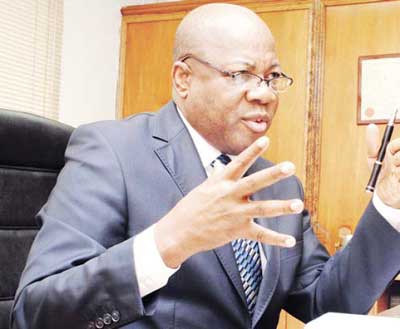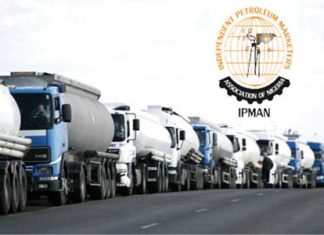Olisa Agbakoba is a renowned maritime lawyer and founder of Olisa Agbakoba Legal (OAL), a law firm in Apapa, Lagos that offers services to clients in diverse areas of business, multinational companies, banks, as well as government agencies and parastatals.
He has made significant contribution to the development of Nigeria’s jurisprudence and was instrumental to the passing of the Coastal and Inland Shipping (Cabotage) Act in 2003.
A recent initiative taken on by OAL was the promotion of The Fly Nigeria Bill which seeks to mandate government officials to fly the national carrier on official international trips.
Agbakoba spoke with Senior Correspondent, GODDIE OFOSE, in his office where he declared maritime industry dead.
Maritime industry
Dead. It is completely dead, because we have got the wrong policies and if you have the wrong policies the impact will be that nothing will happen. The industry was very big when I first came here in 1980, but today, I see nothing and that is a big shame because we have not marked the policy boundaries of what we own.
A lot needs to be done. The maritime industry is very big. The ports were privatised six or seven years ago, but privatised to whom? To foreigners who are looking for their pockets not for Nigerians wellbeing?
Nigeria generates 80 per cent of the cargo that comes into West Africa and Central Africa, but the goods end up going elsewhere.
You ship a car from Belgium to Cotonou (Benin Republic), not to Nigeria, because Nigerian ports are the most expensive in West and Central Africa as a result of the high port charges foreign terminal operators demand. The government is not doing anything about it.
Recently the government made the Shippers Council to become the economic regulator. That is some advantage. But we have to define what we want to do in the maritime sector and go for it.
Look at how all the crude oil gets stolen. We also have to define the role of some agencies. Are they not doing too many things together – like NIMASA into safety, security, standard, and quality?
The time to rethink what our maritime industry can do is now. I have always said that the way to go for the industry is to appoint a minister for shipping because shipping is big; it can contribute in the light of our oil resource.
Shipping can contribute a vast amount of money that won’t even make us remember oil, but you need to have a minister of shipping as you have a minister of petroleum.
I don’t know why shipping is buried under transport. It is a huge portfolio. We will have a massive panorama of ideas and projects funded by Nigerians through banks and guarantees and you will find out that Nigerians would have ships, tugs, verges and all sorts of things moving, even large floating production, storage and offloading (FPSO) platforms that Shell is using.
It can be built and owned by Nigerians. So everything in the maritime industry is owned offshore and when they make profit they take it offshore, not here.
They pay rents and these don’t buy anything. So, they just reap. They take it elsewhere; the same thing MTN is doing. They own nothing. MTN makes more money than all the banks put together; they pay you a rent and you are happy as landlord but they take away the money and develop South Africa.
That is what is happening generally in the economy. Though give full marks to the minister of agriculture and the minister of trade and investment, we need to see more strong policies that will make the growth of Nigeria possible.
Industry inactiveness
A lack of coherent policies. Policy is not a Nigerian favourite. There is no national content and there is no preference for being a Nigerian because when I travel abroad they will say all holders of British passport should come in first and then all other holders should follow.
So, in my country a policy should be designed to give Nigerians special opportunity to explore and exploit the industry.
Aliko Dangote is a billionaire because he understands how to make use of the space. We can have Dangote in all the industries, but the policy must be right.
Duplication of agencies and leakages
It happens because the there is no cohesion, there are overlapping functions. This one is doing that, and that is doing this; and this led to infighting. But if there is a maritime policy agreed to by everybody and is executed by everybody to the benefit of Nigerians then this type of thing may not be eliminated but will be minimised.
The policy gaps are too many and they allow people to take money out of Nigerians’ sweat and take it abroad to develop their countries. To change it, the Cabotage Act has been passed, remember, but it has not worked. The Local Content Act is working but not very well.
So, we need to make sure that nothing escapes us except what is necessary to maintain relations with investors. APM Muller that is the terminal operator in the port bid $25 billion through the Bureau for Public Enterprise (BPE) and the second bidder was like $2 or $3 billion.
But they knew what they were doing; they knew Nigeria is a cash market, so they outbid the competition to make stupendous money, knowing that nobody will go back to look at the lease and concession agreement.
All those things they say they will do, they haven’t done. They have just made the port a bit efficient to exploit cargo turnover and make money and then export it back to Denmark. That is what is happening.
Effect of falling oil price on the economy
It is good that way so that we will think, because oil has become a resource curse. I want it to even go down to $20 because when that happens we will start to look around and say… ‘but didn’t we make money from agriculture?’
Oil money has blinded us. It is time oil money disappeared so that we can wake up. Are we not crazy to import $6 billion worth of tomato from China when we have it here, and even tooth pick?
We are import dependent. The policy should now be import substitution because when we do things locally we will benefit, and there will be enough job creation if we have factories that produce things here.
Import substitution means we are no longer import dependent, we are now building factories and refineries. How can a country that has crude oil import petroleum? It doesn’t make sense.
Policies without results
The system hasn’t worked, we keep talking; but I believe one day the environment will be enabled and people will see reason.
Maybe this falling oil price will be a wakeup call to those who control policies to say, yes we can employ 30 million people in massive agricultural business but have to make sure the cargo turnover is in one day and not in seven years, because no bank will grant a loan without the cargo turnover.
We have to begin to do things efficiently because that way there will be benefits for businessmen because businessmen go in for the profit, and the banks lend for profit also, but the bank can only lend when they see a good security.
We have to overhaul our entire land administration for agriculture and other things. You don’t have to know the governor to get land, just apply; and when a bank sees your papers and sees that your titles are correct, then it can give you the loan.
Imagine if we have 100 Dangotes, imagine what will happen, and then we have 100 small Dangote’s and then 1,000 Olisa Agbakobas, and then everywhere somebody is able to produce because there is power.
A country is built by everybody being employed, so the oil resource curse blinded us to making our brothers and sisters have the opportunity to work by getting loans. This policy dialogue calls attention to the fact that we are turning the wrong way.
The minister of agriculture over the last three to four years has made rice importation a story of the past, so it is doable. We need to empower the people in the maritime sector. I know some captains who have been broken by the failure of policy and retired, like captain Omotosho and others, who have gone into other things.
In the legal sector for instance, 80 per cent of the big money goes away because all these multinationals like Shell and others don’t use us, they use foreign people. Legal services can also be a contributor but the government policies must be right. You must not allow foreign lawyers to practise here.
The Local Content Act is not working well; the laws are there but they are not working. My friend, Ernest Nwakpa, is doing his best but he can be better. If we have leakages everywhere then how do we get employment?
You have to plug all the loopholes so that Nigerians can be empowered in whatever it is they do, whether real estate, law, banking, insurance, oil and gas. I am not saying we should exclude foreigners but am saying we should give them the space to allow us profit from our own country.
Prosecution of Aminu Ogwuche
Generally, prosecuting is the work of the police, but it was also clear that there was institutional fighting between the DSS (Department of State Security) and the police; and therefore the prosecution did not take place, which is unfortunate. Because if Aminu Ogwuche was a suspect in the Nyanya killings, he has gotten away.
Our administration and bureaucracy is very weak. Our institutional process is weak and this is what this case typifies. How can a key suspect in the Boko Haram bombing be allowed to get away because two bodies are fighting? That is terrible.
It is sending the wrong message that we are unable to get our act together, that is what people will be hearing. How can two agencies of the federal government be fighting and watch the man walk away? It is terrible.
Do not blame the lawyer; he is doing his work. It is the two organisations that fought, the police and the DSS, that are responsible.
Moving forward
We need to review our legal framework concerning investigation, prosecution; who handles what, and that again is the reason we have called for the separation of the office of the attorney general from that of the minister of justice.
The attorney general focuses on fighting and prosecuting crime, the justice minister’s role focuses on policies and it is political. But today, the justice minister and attorney general’s position is occupied by one person. It is confusing, because it is being pushed in several directions.
We have called for the separation so that the attorney general’s office can become more efficient.













